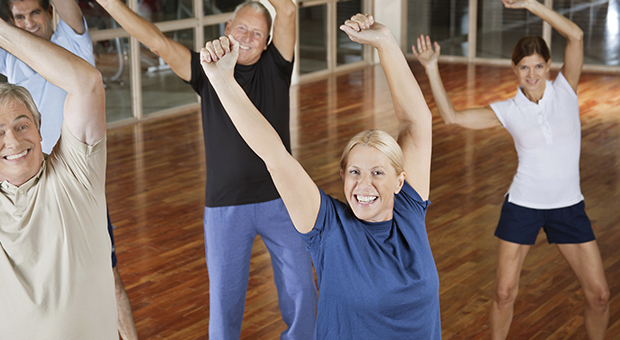The Medical Minute: Cancer patients benefit from an active lifestyle

When diagnosed with cancer, patients expect the standard treatments of chemotherapy, radiation and surgery. However, additional integrated therapies can address the needs of both body and mind when battling or recovering from cancer.
According to Jen Price, senior exercise physiologist at the Penn State Hershey University Fitness Center (UFC), engaging in activities like Pilates during or after treatment can help restore daily living and improve quality of life.
“Pilates by nature is a very therapeutic corrective exercise discipline,” she says.
Pilates is a gentle discipline that combats fatigue and helps with mood and anxiety.
Price, who was recently certified as a breast cancer exercise specialist through the Pink Ribbon Program, says Pilates is appropriate for all cancer patients.
“It carries some of the same benefits as it does for people who don’t have cancer,” she says. Pilates improves circulation, flexibility and strength and can help patients combating the extreme fatigue caused by chemotherapy.
Additionally, the mental benefits sometimes outweigh the physical, since patients may find themselves battling depression.
“The main things with cancer patients are energy and mood, and they’re going to be more relaxed,” she says.
Price says research suggests that, whenever possible, continuing exercise during cancer treatments is beneficial to patients.
“Patients who feel well enough to exercise should try to continue their physical activity levels while they’re going through treatments,” she says.
As with any exercise or wellness program or routine, cancer patients should discuss their regimen and any restrictions they might have with their doctor first.
The program can be done during treatment if cleared by a physician, or usually six weeks post treatment or surgery.
Programs designed for after treatment or surgery typically focus on rebuilding strength and restoring range of motion and mobility. Patients may deal with scarring and tightness in muscles at surgery sites and the area that has been affected.
Breast cancer patients, for example, might experience tightness in the chest wall and tightness in the shoulder.
“You’re working with the patient on basically getting back mobility for everyday activities and everyday function,” Price says.
Something as simple as lifting the arms above the head can be difficult for patients after surgery.
In addition to Pilates, the UFC regularly offers personal healing yoga, mindfulness meditation and tai chi that can be beneficial to patients, as well.
Price says UFC staff can help steer patients toward the services that may be right for them.
For more information on what the UFC offers, visit http://www2.med.psu.edu/fitnesscenter.
Cancer patients are encouraged to talk to their physician first for clearance to participate in a fitness or wellness program.
For more information, contact Theda Shaw, nurse coordinator at Penn State Hershey Cancer Institute, at (717) 531-0003 extension 285863 or tshaw1@pennstatehealth.psu.edu.
The Medical Minute is a weekly health news feature produced by Penn State Milton S. Hershey Medical Center. Articles feature the expertise of Penn State Hershey faculty physicians and staff, and are designed to offer timely, relevant health information of interest to a broad audience.
If you're having trouble accessing this content, or would like it in another format, please email Penn State Health Marketing & Communications.
